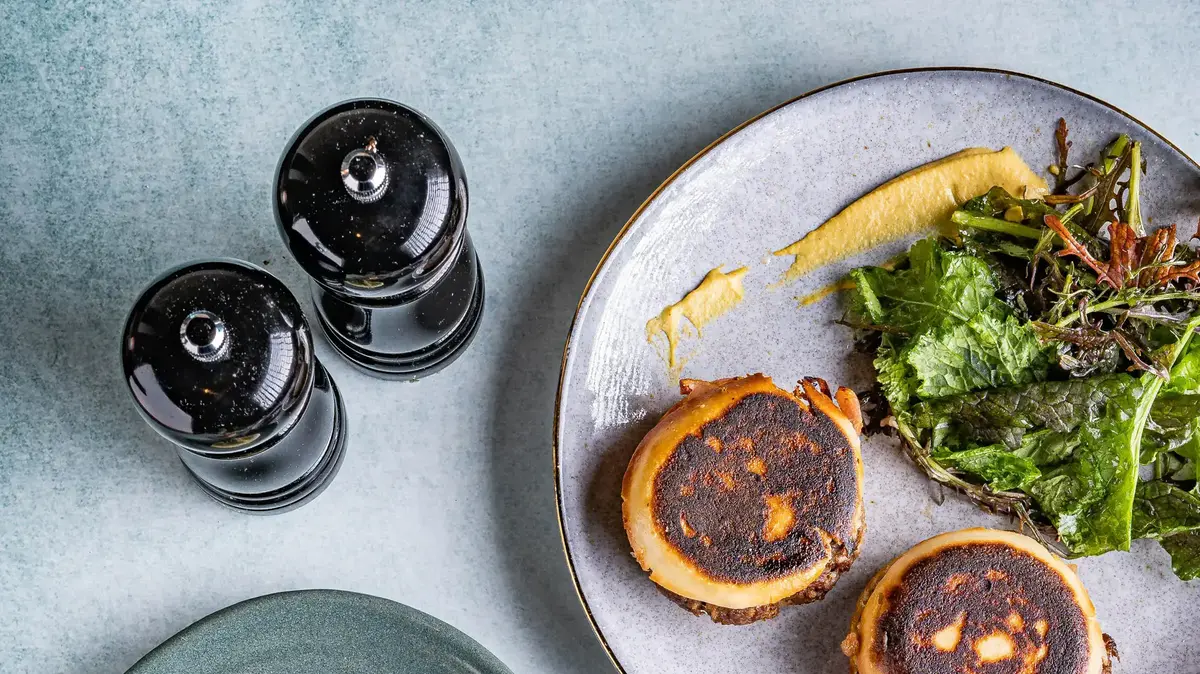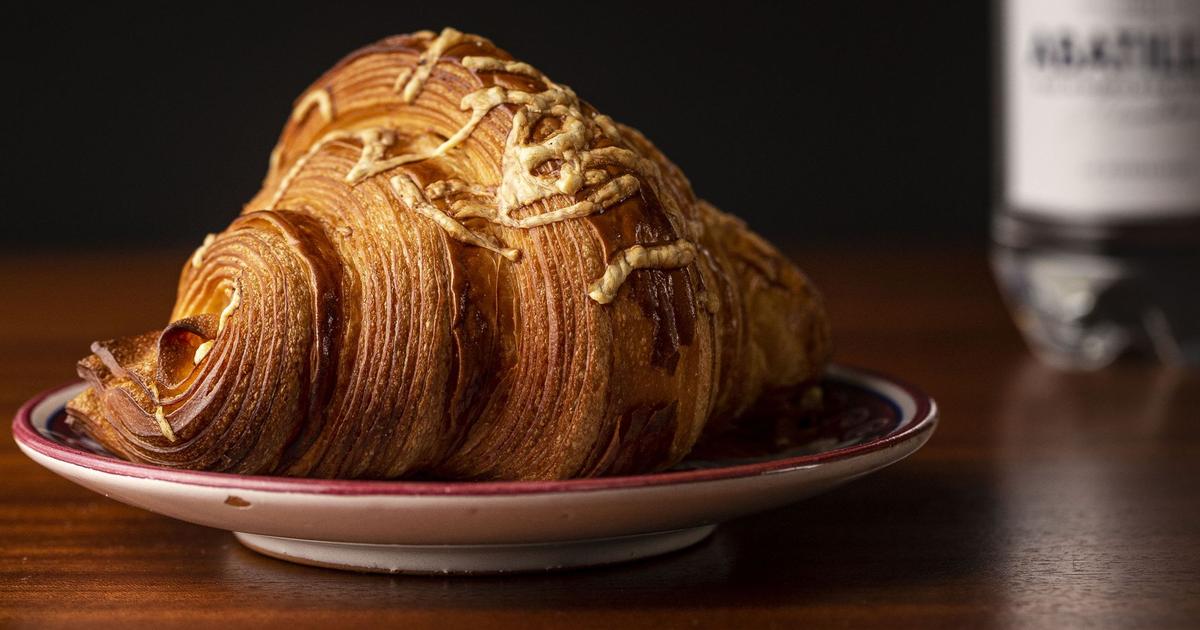A meal of "Milla" warming "The Kitchen" by Strauss (Photo: Achikam Ben Yosef)
In recent years, chefs and confectioners have become an integral part of the Israeli foodtech industry, which has gained great momentum.
They accompany, taste, advise companies, share successes and disappointments, and hope that the day will not be far away when the raw materials and products they are partners in developing will occupy the shelves of marketing chains and restaurants.
"Every technology should also be tasty," says
chef Liran Geruda
, who is currently engaged in research and development and accompanies dozens of companies from the food industry and foodtech.
In addition, he is also a partner in Meala, a foodtech company that warms The Kitchen of the Strauss group, which develops technology that will allow manufacturers of plant-based protein substitutes to offer consumers healthier, cleaner and environmentally friendly products.
"In recent years, the foodtech industry has realized that it should also be tasty in addition to being technological, and has included chefs as consultants. Today, most foodtech companies are also accompanied by chefs," says Geroda.
"The big problem is taste, and the challenge today is to achieve a taste that is most similar to the real thing, because in the end the consumer has to eat it and has to feel that he is eating the real thing, whether it is the fish, the egg, or the milk."
What is your role in the whole process?
"Chemists, food technologists, chefs and confectioners work in my application lab in Haifa. We develop recipes for the industry. Each company has its own challenge, but in general the challenge is to be as close as possible to the real thing. It is of course individual for each project."
How long does it take?
"Each project starts with at least three months until the final recipe is reached using the raw materials that the foodtech company has already created, and then it is transferred to production lines. For example, they give us milk proteins (not cow's milk) and want to make ice cream from them. The texture is a little different from normal milk protein, and we have to The taste and texture is the closest to milk, and there are quite a few challenges in this. Every day at 09:30 we organize a tasting of all the developments of all the projects we developed the day before. Until 100% of the tasting participants confirm that it is delicious, we continue to develop it. It leaves the laboratory only when there is Approval from everyone. The greatest satisfaction is walking around the supermarket and seeing shelves with products you make, and also seeing companies that are growing."
Are there also disappointments along the way?
"We work very hard on development, and products don't always get off the ground. Sometimes startup companies run out of money, don't manage to raise money and all the work goes to waste. There can also be cases where we like the recipe, but the customer is less connected, and then it comes back to us for further development, for improvements. But a project has not yet fallen on that."
What future do you foresee for foodtech developments?
"Of course, not all developments will conquer the market. As in the traditional industry, some products eventually fail and do not become a hit. There are also regulatory challenges that need to be overcome along the way. But I am sure that in less than 10 years we will see products that we are working on both in restaurants and in the marketing chains On them now."
Chef Liran Geruda, a partner in Meala heats The Kitchen (Photo: Naama Ben Simhon)
The sweetness after
"Every day I taste six different types of chocolates and another four types of cookies. Sometimes also cakes and other desserts," says
Hila Kazas, a pastry chef who works at the foodtech company DouxMatok
, which developed incredo SUGAR - a technological solution for reducing sugar, based on natural cane sugar and allows a reduction of up to 50% in the amount of sugar while maintaining the sweet taste.
"The professional challenge is that the taster's experience will be exactly the same as tasting a product that does not have reduced sugar. People will see that with our product it is possible to make truly elite confectionery."
More in Walla!
Lung cancer: the treatment of cancer patients in early stages
In collaboration with the Israeli lung cancer association
Hila Kazas, pastry chef - works at the foodtech company DouxMatok (photo: courtesy of Doumtok)
The tastings, says Kazes, are a central tool in her work, and there are also very clear rules.
"We really specialize in this, know how to arrive ready for tastings, when to rest between tastings," she says.
"For example, half an hour before tasting you must not eat, drink coffee, and if you drink - then only water. We also have a tasting room with individual separation for each taster and a red light that neutralizes the appearance of the product for the sake of comparison. Between tastings we drink water. We taste this product or After as many times as necessary, until we come and say 'That's it!'"
What was your most exciting moment during your work?
"About two weeks ago, for example, there was a meal for the company's management, and we had the opportunity to show them our capabilities and creativity. Based on our product, we developed with the team desserts of a very high level. Now, by the way, the R2M group is launching cakes with our sugar, which will be sold without the red stickers indicating the amount sugar high".
Desserts with incardo sugar (photo: courtesy of Domtok)
Culinary in the laboratory
"In my case, it's some kind of perfect match between my skills and my loves," says
chef Amir Ilan, who accompanies the Aleph Farms company
, which deals in cultured meat and develops suitable steaks from cows that have not undergone genetic engineering.
"On the one hand I like technology and chemistry, on the other hand I have my experience in meat. All my professional years I have been dealing with steakhouses and meat. So when they came to me about four years ago with this idea, from a personal point of view it was perfect."
What do you do as part of your job?
"I have two hats. With one foot I'm in development in the laboratory, where a product that doesn't exist is being developed, something completely new. With the other foot I'm in the culinary arts: the recipes, the food, the chefs, the customers. It's something unusually fascinating. Usually a chef takes raw material , looks at it, says 'what will I do with it', tastes, tries and combines all his artistic skills to make it some kind of creation. In our case I came clean thinking about what is the optimal product, what is the perfect steak, which is also a very interesting question. Even before there was technology, they came to me to think about what a perfect steak is. It was a big challenge."
Ilan admits that the most exciting moment for him was "putting this piece of meat on the pan, and the smell that arose was as if we had created something. The challenge afterwards was to continue developing, to make dishes and recipes out of it, to deal with chefs, with questions. The idea is to produce raw material that connects to The future, and also to take the classic recipes and look at them differently. As mentioned, our product already exists. We assume that the first launch will probably be in Singapore. We are currently waiting for regulatory approvals to launch in Israel as well. It may already be served in restaurants in the first quarter of next year."
Chef Amir Ilan, accompanying the Aleph Farms company (photo: courtesy of Aleph Farms)
Intermediate: for the sake of the children
"Working in a restaurant and in a foodtech company are two different worlds,"
says
Itay Shalu, Alfred's development chef for the
development and improvement of textures and flavors of vegetable proteins focusing on whole pieces, such as alternatives to yellow cheese, chicken breast, fish, pastrami and more.
"In a restaurant, you have to manage yourself in the face of challenges that are currently happening, in front of the guests who want to have the best experience. Working in a foodtech company is completely different, you work in front of schedules, processes, a product that needs to be built. You work in front of investors, presentations, presenting the products."
He says that his first connection to his current occupation was because of his desire as a father of four children to develop healthy food.
"It is very important to me what they eat," he says.
"The way I see the food of the future is something that is very important to me. People today understand more about where the world is going. For example, what we develop does not come from an animal. Our specialty is textures, we bring a lot of innovation in the field of textures, we build the prototype for food companies From which in the future they will be able to produce the products."
Shalev adds: "My current challenge is thanks to my culinary senses to create a tastier product, as close as possible to the original product. The fact that I am a chef and that my life is very developed and precise helps the group to be precise in everything related to the texture, and most importantly the taste. Our big challenge is to make A product that is the tastiest there is. I come from a background of Michelin restaurants, from a place where excellence and attention to small details is so high. That's why I can actually contribute in everything related to the small details of the flavors, which is less developed by development people without a culinary background. I come and complement the development people ".
Don't you miss working in a restaurant kitchen?
"I've worked in many kitchens of the highest level restaurants. Today I'm 51 years old, the challenges now are different. I'm not interested in running a restaurant again. I still cook for private events, but my thrill today is much deeper, like for example turning out a perfect piece of 'chicken breast' made of chicken".
Itay Shalu, the development chef of Alfred's company (photo: Public Relations)
Beef kebab with mushrooms
When some of the technological developments actually reach restaurants, there is no doubt that the chefs responsible for the dishes coming out of the kitchen will also face an interesting challenge.
"First of all, the level of interest in technological developments depends on the chef himself and what interests him in life," says
Oral Kimchi, the chef of Popina restaurant in Tel Aviv
.
"There are those who like to stay in their corner, in their niche and don't want to move away because it's convenient for them, it's profitable for them. In general, I'm always interested in trends happening in the world, not necessarily those related to foodtech. I check, research and decide if it's suitable for a restaurant or not. The same goes for everything related to foodtech developments. For me, it's a new raw material, a process that's happening, I relate to it and try to understand if it's appropriate or not."
Kimchi recently joined a number of Israeli startups in the Strauss DeKitchen incubator and held the "meal of the future" in his restaurant based on a unique menu, where all the dishes consist of a combination of local raw materials and sustainable raw materials of the foodtech ventures.
Among the dishes presented were cocktails from the Better Juice company, which develops a natural process to reduce up to 80% of the amount of sugar found in fruit juices;
Brioche bruschetta with 'meat' from the Meala company, which eliminates the use of harmful food additives used to improve texture and taste in meat substitutes, together with an aioli sauce made from protein from the Yeap company, which develops a unique process for producing proteins made from yeast and contributes to reducing food waste in the industry.
There were also beef kebabs from the Mush Foods company, which grows edible mushroom roots to create hybrid dishes that combine meat and plant raw material;
and Imagindairy spice ice cream, which develops real, sustainable milk proteins.
"There is no doubt that working with the raw materials of the startups was more difficult," Kimchi admits.
"If now, for example, you bring me a fish, then I already know the raw material, and I'll know if it's worth grilling, steaming, how to cook and with what to serve. In the 'meal of the future' I was exposed to raw materials that are completely new to me. For example, I've never made an aioli sauce from The raw material I received and I had to do experiments to see how it reacts, how it tastes. We researched how it would be correct to present the raw material in the most flattering way."
Do you think the various developments will indeed occupy the shelves of writers and restaurants in the future?
"Surely there is a place for this in the wider culinary field, that is, the adoption of technologies in the big companies and in the products that we see in the marketing chains and in the restaurants. But as with everything, not everything works. I think some of the developments will catch on very quickly, already in the near future; and some will not catch on, or it will take time for them to catch on" .
Oral Kimchi, the chef of the Popina restaurant in Tel Aviv (photo: Achikam Ben Yosef)
Of money
Tags
Food Tech
food















